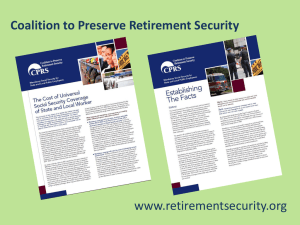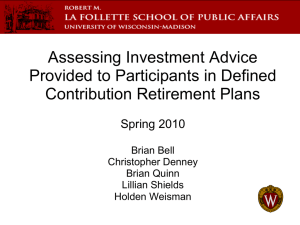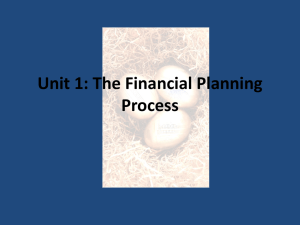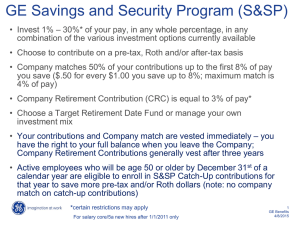Slides
advertisement
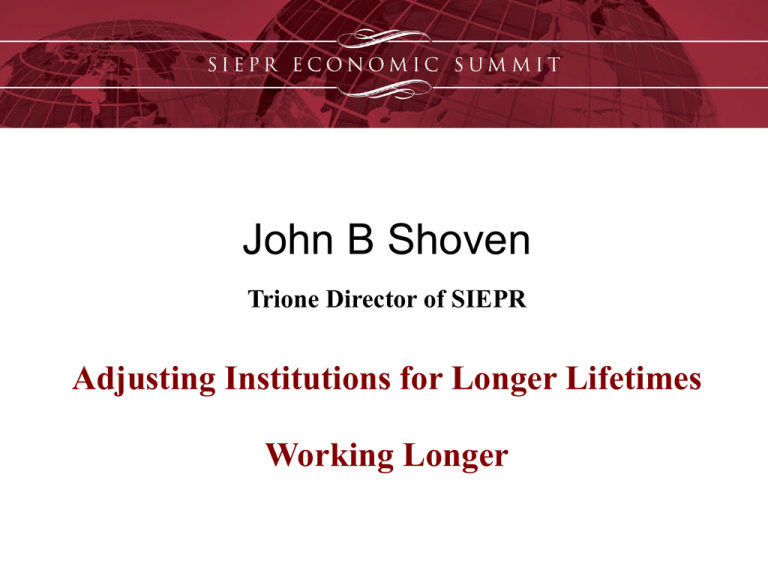
John B Shoven Trione Director of SIEPR Adjusting Institutions for Longer Lifetimes Working Longer Living Longer – It is a Fact The Probability of Future Birthdays for 65-Year Olds 100 % 65-year old males in 1955 90 80 70 Dwight Eisenhower and Groucho Marx were 65 in 1955 60 50 50% Chance of Reaching 77.5 40 30 20 20% Chance of Reaching 85 10 8.8% @ 90 0 65 70 75 80 85 90 95 100 105 Living Longer – It is a Fact The Probability of Future Birthdays for 65-Year Olds 100 % 65-year old males in 1955 75% Chance of 77.5 90 65-year old males in 2014 80 e.g. Bruce Springsteen 70 50% Chance of Reaching 85 60 60% increase 50 40 50% Chance of Reaching 77.5 30% Chance of 90 30 20 20% Chance of Reaching 85 10 8.8% @ 90 0 65 70 75 80 85 90 95 100 105 Living Longer – It is a Fact The Probabilities of Future Birthdays 100 % 65-year old males in 1955 90 65-year old males in 2014 80 65-year old females in 1955 70 65-year old females in 2014 60 40% Chance of Reaching 90 50 40 30 Meryl Streep turns 65 in 2014 Agatha Christie turned 65 in 1955 5.6% Chance Of 100 20 10 0 65 70 75 80 85 90 95 100 105 Are These Four People Really the Same Age? Retirement Lengths for Couples Table 2. Life Expectancies of Retirement Age Married Couples Age of Husband 62 63 64 65 66 67 68 69 70 Age of Expected Years Wife to First Death 60 61 62 63 64 65 66 67 68 17.53 (28) 16.85 (27) 16.18 (26) 15.51 (25) 14.85 (24) 14.19 (23) 13.53 (22) 12.89 (21) 12.26 (20.5) Expected Years to Second Death Expected Length of Widowhood 29.11 (37) 28.21 (36) 27.31 (35) 26.41 (34) 25.52 (33) 24.64 (32) 23.75 (31) 22.87 (30.5) 22.00 (29.7) 11.58 11.36 11.13 10.90 10.67 10.45 10.22 9.98 9.74 Note: Numbers in parenthesis represent 90th percentile outcomes Data: Cohort life tables from Social Security used in the 2012 Trustees Report for men born on 1/1/1951 and women born on 1/1/1953 A Few Important Facts • Average retirement age is 64 for men, 62 for women • At those ages, people need to prepare for at least 30-year retirements • At those ages, the survivor of a couple outlives their spouse by an average of 11 years • YOU CAN’T FINANCE 30-YEAR RETIREMENTS WITH 40-YEAR CAREERS! The Consequences of Trying to Finance 30year Retirements with 40-Year Careers • Vastly underfunded state and local pension funds • Social Security Trust Fund becomes exhausted in 2033, followed by a roughly 25% cut in benefits • Fewer workers relative to retirees • Lower standard of living for retired workers What Can We Do About It? • The easiest solution is to work longer • For instance, 48-year careers and 22-year retirements • Today’s Stanford undergraduates probably will need to work until at least 70 Hidden Early Retirement Incentives Need to be Eliminated - I • Social Security turns into a pure tax on work soon after 35 years of work • Introduce “Paid Up Workers” = People who have already worked 40 years. Paid Up workers would not face either the employer and the employee payroll tax for Social Security and Medicare • This would remove a 15.3% wedge between employer’s cost and employee’s take home pay Hidden Early Retirement Incentives Need to be Eliminated - II • Medicare could be changed from Medicare as a Secondary Payer (MSP) to Medicare as a Primary Payer (MPP) • Today, people 65+ get Medicare unless they work. If they work, then the employer sponsored health plan must include them. • MPP would mean that those 65 and over would be covered by Medicare whether they work or not Simply Change the Terminology of Social Security – Change Full Retirement Age to 70 Monthly Benefits for Different Commencement Ages 2,800 Possible New Definition of Benefits at “Full Retirement Age” 2,600 2,400 2,200 Benefits at Official Full Retirement Age 2,000 1,800 Why Not Have the Full Retirement Age Correspond to the Maximum Monthly Benefit? 1,600 1,400 62 63 64 65 66 67 68 69 70 We Need To Change Labor Market Institutions to Reflect Longer Lifetimes • • • • Change Social Security – Paid Up Change Medicare – MPP Change the “Full Retirement Age” Facilitate Part Time Opportunities for Senior Workers • Retrain workers in their mid-career • Look at how Japanese labor markets work Only Economists Could Turn Living Longer Into a Problem!


